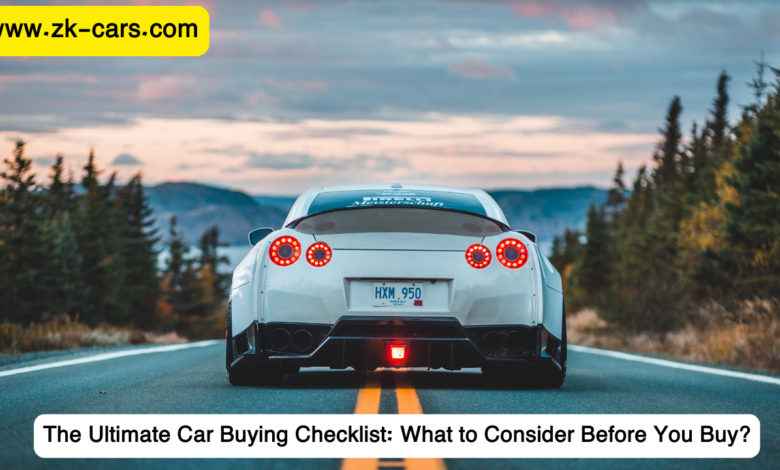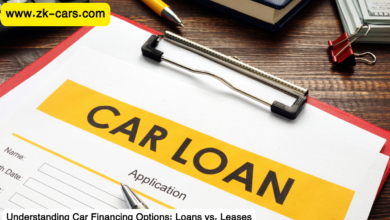Plan Your Purchase: Budgeting for Your Next Car"
"Plan Your Purchase: Budgeting for Your Next Car"

The Ultimate Car Buying Checklist: What to Consider Before You Buy
Buying a car can be an exciting but daunting process. Whether you are a first-time buyer or upgrading to your dream vehicle, making an informed decision is crucial. This comprehensive car buying checklist will ensure you cover all essential aspects, so you can drive away with confidence.
1. Define Your Budget: Know What You Can Afford
Before looking at cars, it’s important to set a budget. This includes more than just the car’s purchase price. You need to account for additional costs like:
- Taxes and registration fees
- Insurance premiums (higher for certain models or new cars)
- Maintenance and repairs
- Fuel consumption and efficiency
Setting a realistic budget also helps you decide whether you can afford a new or used car and need financing options like loans or leases.
2. Decide: New Car vs. Used Car
Both new and used cars have advantages and drawbacks, so consider these carefully:
- New cars: Offer the latest features, warranties, and lower maintenance needs initially. However, they depreciate quickly in value.
- Used cars: Are more affordable but may require more frequent repairs and checks. Always check the vehicle history report before buying a used car.
3. Choose the Right Type of Car for Your Needs
Your lifestyle will determine which car type is best for you. Consider:
- Compact cars: Ideal for city driving and better fuel economy.
- SUVs or Crossovers: Offer more space and off-road capabilities.
- Sedans: Provide a balance between comfort and efficiency.
- Electric vehicles (EVs): Are eco-friendly but require charging infrastructure.
Evaluate whether you need a family-friendly vehicle, a sporty ride, or an eco-conscious choice.
4. Research and Compare Models
Look for reliable brands and models that align with your needs. Some factors to compare include:
- Fuel economy (miles per gallon)
- Safety ratings and features (like airbags, ABS, and lane assist)
- Performance reviews from trusted sources
- Owner reviews and testimonials
Using comparison tools online can help you make better decisions by narrowing down your options based on price, fuel efficiency, and other features.
5. Check Financing and Loan Options
If you’re not paying upfront, explore the various car financing options available:
- Dealership financing: Convenient but may have higher interest rates.
- Bank or credit union loans: Often offer better rates.
- Leasing: Ideal if you prefer driving new cars every few years.
Compare loan terms and interest rates to find the most affordable deal.
6. Inspect the Car: Exterior and Interior Check
When viewing a car in person, thoroughly inspect the vehicle’s condition. Pay attention to:
- Exterior: Look for scratches, dents, or signs of repainting.
- Interior: Check for wear on seats, dashboard, and floor mats.
- Lights: Ensure all headlights, indicators, and brake lights work properly.
- Tires: Uneven wear may indicate alignment issues.
Don’t hesitate to bring along a mechanic for a professional opinion, especially if buying a used car.
7. Take a Test Drive
A test drive is essential for assessing the car’s performance. Here’s what to evaluate during the drive:
- Comfort: Are the seats supportive, and is the cabin quiet?
- Braking: Check for smooth, responsive braking.
- Handling: Evaluate how the car responds around corners.
- Acceleration: Ensure it accelerates smoothly without lag.
Test driving both in city and highway conditions will give you a better understanding of the car’s capabilities.
8. Review the Car’s History Report (For Used Cars)
When buying a used car, it’s essential to check the vehicle history report. Key points to focus on:
- Accident history: Ensure there are no serious accidents or repairs.
- Mileage: Verify the mileage is consistent with the vehicle’s age.
- Ownership records: Check if it was owned by multiple users or rented out.
- Maintenance history: Look for regular servicing and repairs.
Using services like Carfax or AutoCheck can provide a detailed report.
9. Negotiate the Price
Once you’re satisfied with the car’s condition, it’s time to negotiate the best price. Tips for effective negotiation:
- Do your homework by researching the car’s market value.
- Be firm but polite—don’t rush the process.
- If you’re financing through the dealer, review the loan terms carefully.
Dealers often offer discounts, bonuses, or special packages—so don’t hesitate to ask for additional perks.
10. Check the Warranty and Insurance Options
Whether you’re buying new or used, always inquire about warranty coverage:
- New cars: Usually come with a manufacturer’s warranty.
- Certified pre-owned (CPO) cars: Include extended warranties.
Additionally, compare insurance policies to ensure you get the best coverage without paying excessive premiums. Comprehensive insurance might be required for financed cars.
11. Finalize the Deal and Paperwork
Before you sign, ensure you understand all the terms and conditions. You will need to complete:
- Sales contract: Review it carefully for hidden charges or add-ons.
- Registration documents: Confirm that the car is registered in your name.
- Loan agreements (if applicable)
Ensure you receive all necessary documents, including the title, bill of sale, and insurance papers.
12. Plan for Maintenance and Upkeep
A well-maintained car lasts longer and retains better value. Create a maintenance schedule that includes:
- Oil changes and tire rotations
- Brake checks and filter replacements
- Battery inspection for electric or hybrid vehicles
Additionally, stay updated on recall notices for your car model to ensure it remains safe to drive.
Conclusion
Buying a car is a significant investment, and following this ultimate car buying checklist will help you make a well-informed decision. From budget planning to vehicle inspection and test drives, every step is crucial to ensuring you get the right car for your needs and lifestyle. Take your time, do your research, and negotiate smartly—so you can enjoy your new car without regrets.
Most Common Questions about Car Buying
- What’s better: buying new or used cars?
It depends on your budget and needs. New cars offer the latest features but depreciate faster, while used cars are more affordable but might require more maintenance. - How do I know if I’m getting a good deal on a car?
Research the car’s market value online using tools like Kelley Blue Book or Edmunds to compare prices. - What documents do I need to buy a car?
You’ll need the sales contract, title, registration, and proof of insurance. If financing, loan documents are also required. - Can I buy a car with bad credit?
Yes, many dealers offer special financing for buyers with bad credit, though you may have higher interest rates. - Is leasing better than buying?
Leasing can be a good option if you prefer driving new cars every few years, but you won’t own the car at the end of the lease term.




